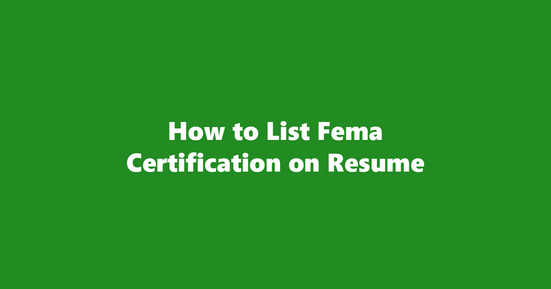Fema Certification on Resume
Complete guide on listing fema certification on your resume. Learn proper formatting, placement strategies, and see real examples that help you stand out to employers. Includes tips for highlighting your fema skills effectively.

What Is Fema Certification
FEMA (Federal Emergency Management Agency) offers certifications that validate an individual's expertise in emergency management and response. These certifications are issued by the Department of Homeland Security and focus on core competencies such as incident command, emergency response planning, disaster recovery, and hazard mitigation. The FEMA Professional Certification Program is recognized as a significant benchmark in the industry, ensuring a high level of knowledge and proficiency among its certified professionals.
To be eligible for a FEMA certification, applicants must meet prerequisites such as specific training or experience requirements. For example, the Emergency Management Institute's (EMI) IS-100 course is often a prerequisite for many certifications. The validity period of each certification varies, with some lasting up to four years before requiring renewal through continued education and practical application.
The estimated time to prepare for a FEMA certification can range from several weeks to months, depending on the specific program and the candidate's existing knowledge base. The difficulty level may be considered moderate to high due to the depth of subject matter covered.
Should I Include FEMA Certification on Resume?
Including your FEMA certification on your resume can demonstrate your commitment to professional development, emergency management expertise, and readiness for leadership roles in related fields. However, its value depends on the industry and career stage you are pursuing. For instance, IT is particularly valuable for positions within government agencies, non-profit organizations, and private companies involved in emergency management or disaster response.
If you have recently obtained your certification, highlighting IT can demonstrate your current skills and commitment to staying updated in the field. On the other hand, if your certification is outdated or not directly relevant to the position, IT may be less important to include. Regional relevance also plays a role; certifications may hold more weight in regions frequently affected by natural disasters or with strong emergency management industries.
Hiring Managers And FEMA Certification on Resume
- Hiring managers often view FEMA certification as evidence of a candidate's specialized knowledge and commitment to the field of emergency management.
- The specific skills they associate with this credential include incident command, disaster response planning, hazard mitigation, and emergency management leadership.
- In industry-specific contexts, such as government agencies or non-profit organizations focused on disaster relief, FEMA certification can set candidates apart from competitors.
- However, in other industries, the importance of FEMA certification may be less relevant or not considered at all.
- Any potential negative perceptions to be aware of include a lack of current certification or evidence of continued professional development, indicating that a candidate's skills may be outdated.
How to List FEMA Certification on Resume
- Use the following formatting: [Certification Name] – [Certifying Organization (FEMA)], [Expiration Date if applicable]. Include any relevant subspecialties, such as Incident Command System (ICS). Example 1: Professional Development Series (PDS), FEMA, Expected Expiration: 2024. Example 2: Incident Command System (ICS) for Single Resources and Initial Action Incidents, FEMA, Certification Number: ABC-123.
- Do not include certification numbers/IDs unless explicitly requested by the job posting or company policy.
- If your certifications are currently valid, do not note expiration dates.
- Include the certifying organization (FEMA) to validate the credibility of your certification.
- For in-progress certifications, use "In Progress" followed by the same formatting as completed certifications.
Where to List FEMA Certification on Resume
- Place FEMA certifications in a dedicated certifications section near the top of your resume, following education and professional experience sections.
- If you have recently obtained a certification, consider mentioning IT in your summary or objective statement as well.
- In some cases, if your certification is directly related to the position and your most relevant skillset, IT may be appropriate to list IT within the Professional Experience section under the corresponding job duty description.
- When listing multiple certifications, order them by relevance to the position you are applying for, with FEMA certifications listed near the top of the certifications section if they are the most relevant.
Examples of How to List Fema Certification on Resume
Example 1 - For a Technical Resume
Certifications Professional Development Series (PDS), FEMA, Expected Expiration: 2024
This format is ideal for technical resumes as IT quickly communicates the certifications section's contents. The inclusion of the certification's expiration date showcases your commitment to continuous learning and staying updated in the field.
Example 2 - For a Recent Graduate
Skills & Certifications FEMA Professional Development Series (PDS), Expected Expiration: 2024
For recent graduates, IT is essential to highlight their unique skills and certifications alongside other educational achievements. Grouping both together showcases the value that newly minted professionals bring to a potential employer.
Example 3 - In a Dedicated Certifications Section
Certifications & Licenses FEMA Professional Development Series (PDS), Expected Expiration: 2024
In some industries and roles, certifications hold significant weight and require a dedicated section to fully emphasize the candidate's qualifications. By separating these credentials from other sections, employers can quickly identify the relevant expertise of the applicant.
Example 4 - In a Skills-First Resume Format
Skills (continued) Incident Command (FEMA Professional Development Series PDS), Expected Expiration: 2024
When crafting a skills-first resume, IT is crucial to highlight the most pertinent abilities that set candidates apart. By including certifications within the skills section, employers can immediately recognize the competencies relevant to the role being applied for.
Copyright ©2025 Workstory Inc.